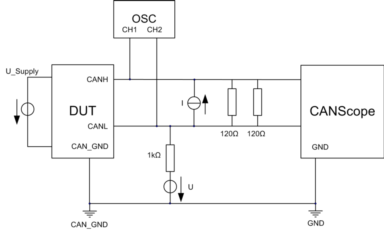“The uneven quality of CAN nodes will bring greater security risks to the CAN bus network, so the consistency test of the CAN nodes is particularly important. This article will discuss the input voltage threshold test of the CAN nodes.
“
The uneven quality of CAN nodes will bring greater security risks to the CAN bus network, so the consistency test of the CAN nodes is particularly important. This article will discuss the input voltage threshold test of the CAN nodes.
CAN conformance testing is mainly divided into three parts: physical layer, link layer, and application layer. In the CAN network, each node following the CAN conformance test is an important prerequisite for ensuring the stable operation of the bus. In the physical layer, the CAN bus design specification has strict regulations on the input voltage threshold of the CAN node. If the input voltage threshold of the node does not meet the specification, abnormal working conditions are prone to occur after field networking, and communication occurs between nodes Failure, so the input voltage threshold test is also an important part of the CAN physical layer conformance test.
1. Test Standard
Before the product is put into use, each manufacturer must conduct the input voltage threshold test of the CAN node, which generally follows the ISO 11898-2 input voltage threshold standard. The specific requirements are shown in Table 1.
Table 1 ISO 11898-2 input voltage threshold standard

Note: For the detailed content of the input voltage threshold standard, please refer to Table 4 (DC parameters for recessive output of CAN node) and Table 5 (DC parameters for dominant output of CAN node) and related parts in the original text of IOS 11898-2-2003.
2. Test principle and steps
1. Implicit input voltage test

Figure 1 Principle of invisible input voltage test
Under the bus load and common-mode voltage conditions shown in Table 1, the implicit input voltage threshold test is performed according to the test principle of Figure 1:
l Use CANScop e-Pro to monitor CAN bus message frame, DUT is in the state of sending message;
l Adjust the voltage of the CANH idle time on the U monitoring oscilloscope to -2V and 6.5V, and adjust the current source I to make Vdiff reach the upper limit of 0.5V;
Note: For the accuracy of the results, please repeat the above steps for 10 consecutive tests and record the results of each test.
Conclusion: in![]()
![]() When ≤0.5V, if DTU can send messages normally, it will be invisible
When ≤0.5V, if DTU can send messages normally, it will be invisible![]()
![]() The input voltage test passed.
The input voltage test passed.
2. Dominant input voltage test:

Figure 2 Principle of Dominant Input Voltage Test
Under the bus load and common-mode voltage conditions shown in Table 1, the dominant input voltage threshold test is performed according to the test principle of Figure 2:
l Use CANScope-Pro to monitor CAN bus message frame, DUT is in the state of sending message;
l Adjust the voltage at the idle time of CANL on the U monitoring oscilloscope to -2V or 6.1V respectively, and adjust the current source I to make Vdiff at a speed of 0.1V in steps, from recessive![]()
![]() The upper limit of the input voltage is adjusted to dominant 0.5V
The upper limit of the input voltage is adjusted to dominant 0.5V![]()
![]() The lower limit of the input voltage is 0.9V.
The lower limit of the input voltage is 0.9V.
Note: For the accuracy of the results, please repeat the above steps for 10 consecutive tests and record the results of each test.
Conclusion: In the above two cases, when the dominant input voltage limit is 0.5V, the DUT should still be able to send CAN message frames. When the dominant input voltage limit just reaches 0.9V, if the DTU stops the CAN message Frame transmission, then dominant![]()
![]() The input voltage test passed.
The input voltage test passed.
3. CANDT conformance test system
In order to improve test efficiency, save labor costs, and at the same time improve test accuracy and avoid manual measurement statistical errors, ZLG Zhiyuan Electronics has launched a CAN conformance test system. CANDT takes ISO11898 standard as the core and focuses on the CAN bus test of domestic mainstream new energy OEMs. The standard is the main basis, and the test function meets the test requirements of the physical layer, link layer, and application layer.

Connecting automobile or single-node components to the CAN conformance test system can automatically complete the CAN bus physical layer, link layer and other tests, and automatically export test reports, which can be used as a basis for host factory admission. After the CANDT conformance test, for the problems shown in the test report that the test failed, CANScope can be used to locate and troubleshoot faults to speed up the development of CAN bus stability.
The Links: G084SN03-V4 LM170E03-TLG3